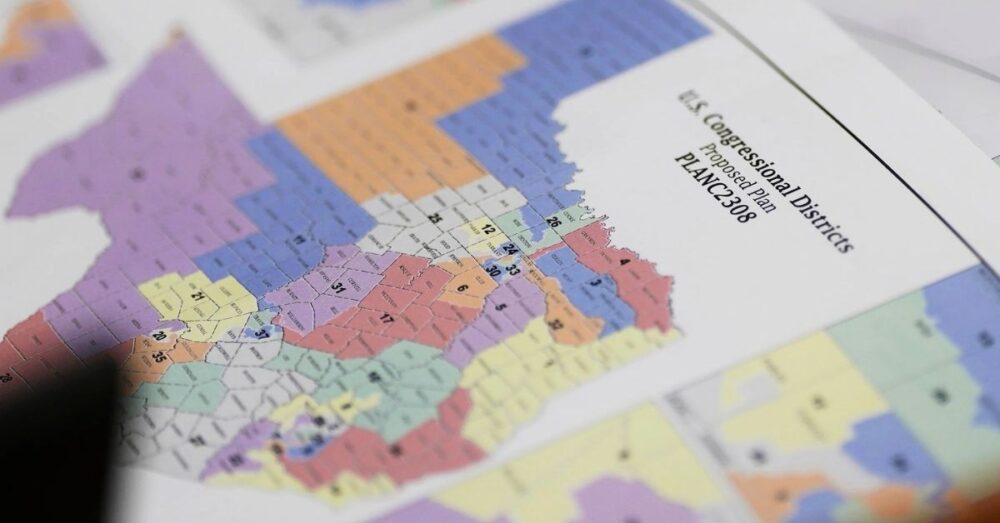(Texas Scorecard) – EL PASO—Testimony in the Texas congressional redistricting case continued Monday, focusing on expert witnesses presented by the left-wing Plaintiffs and the State.
The latest congressional map creates five new GOP-opportunity districts. Plaintiffs suing over the map include the League of United Latin American Citizens (LULAC), the National Association for the Advancement of Colored People (NAACP), the Mexican American Legal Defense and Educational Fund (MALDEF), and the Mexican American Legislative Caucus (MALC).
Dr. Moon Duchin
Plaintiffs called Dr. Moon Duchin, an election data expert, as their witness.
Late Sunday evening, Plaintiffs’ attorneys submitted an updated report from Dr. Duchin. The State objected, arguing they had insufficient time to review the new report and asked the court to strike it from the record.
Judges refused to strike the report but stipulated that the Plaintiffs could not use the report during direct examination.
Dr. Duchin explained that delays in submitting her report were caused by the Plaintiffs’ delay in providing her the data she had been requesting “for months.”
Her analysis relied on election maps she had generated, attempting to make them “blind to race” while only considering partisanship. However, her maps differ substantially from the State’s proposed maps.
Duchin concluded that purely partisan considerations could therefore not have produced the 2025 maps, suggesting race must have been considered during their creation.
During cross-examination, Duchin admitted that her analysis assumed “traditional partisan considerations.” She conceded that her report might not account for other nontraditional data inputs, such as block-level partisan data, if the State had access to such information.
Duchin noted that while block-level partisan data is not available from previous census releases, it could be derived from other data sources or even purchased from third-party providers. She stated that such data could be reliable if derived from a “good data source.”
This position contradicted earlier testimony from Plaintiffs’ expert Matt Barreto, who argued such data would be unreliable.
These discrepancies emerged as a focal point in the day’s questioning, suggesting that additional factors could explain differences between the experts’ maps and the State’s actual plan.
Dr. Richard Murray
The court then viewed video testimony from Dr. Richard Murray, a professor at the University of Houston who was called as a witness by the Plaintiffs. Murray initially posited that movement of minority populations between districts demonstrated racial intent by the Legislature, though his argument was questioned for its coherence.
Murray clarified that it is not possible to know legislators’ private motivations, so analysis must focus on the effects of redistricting maps. Yet he simultaneously determined the intent of the legislators to be “clearly racial discrimination” based on his findings.
He acknowledged that in attempting to redraw districts to add five Republican seats, moving concentrated minority populations was unavoidable—a natural byproduct of partisan map-drawing.
Murray stated that even if Republicans didn’t want to move these populations during such redistricting, it would be “an impossible task.”
He also contended that the five districts specifically mentioned in the Department of Justice letter were minority-heavy. This selection is not attributable to the State of Texas and the DOJ is not named as a defendant in the case.
Murray’s report drew repeated scrutiny over alleged factual errors, culminating in judges questioning its accuracy. After repeated judicial comments, the State moved to strike Murray’s testimony.
Following Murray’s appearance, the Plaintiffs officially rested their case after five days of hearings.
The State then began presenting its witnesses.
Senator Phil King
State Sen. Phil King (R–Weatherford), who sponsored the redistricting bill in the Texas Senate, was the first to testify.
King addressed all claims raised by Plaintiffs about his role, stressing that the redistricting process was transparent and included numerous opportunities for input from Democrat lawmakers and the public.
Evidence was submitted showing that King reached out to Democrats, invited them to argue against the bill, and held multiple hearings beyond what was required.
He asserted that race was not a consideration during the redistricting process and said it was commonly understood—even in the media—that the effort was driven purely by partisan considerations.
Plaintiffs pressed King on the fact that an overwhelming majority of public testimony at regional hearings opposed the plan.
King responded, agreeing that “most of the testimony made clear that Democrats did not want Republican redistricting.”
Chad Dunn—lead attorney for plaintiffs—suggested that not all of the critics were Democrats, and that King only assumed so because they were “people of color.” King clarified that it was clear from their testimony that they were speaking from a Democrat perspective.
The day concluded with King still under cross-examination. Due to scheduling conflicts, his next appearance is scheduled for Thursday.
The trial will continue as the State presents additional witnesses and evidence addressing the plaintiffs’ allegations. President of the National Republican Redistricting Trust Adam Kincaid, who is believed to have drawn the map, will take the stand on Tuesday.
The trial will continue through Friday. Appeals are expected regardless of the outcome.
Day 4 Trial Coverage
Day 3 Trial Coverage
Day 2 Trial Coverage
Day 1 Trial Coverage


